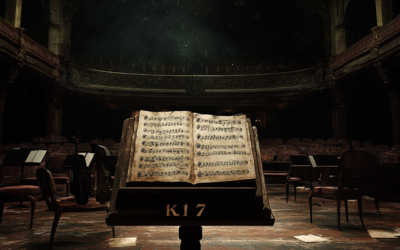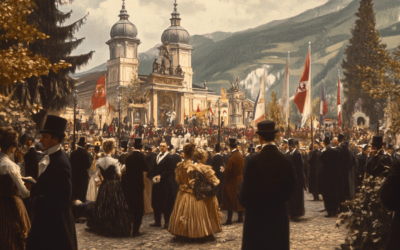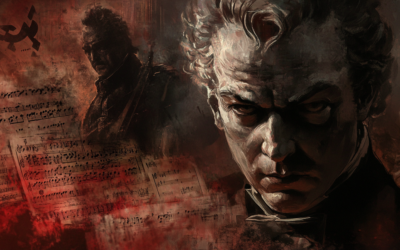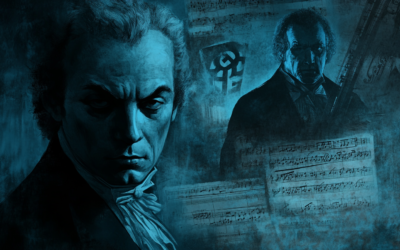Wolfgang Amadé Mozart
An Expedition Fueled by Ambition
The Mozarts’ Italian journey of 1769 was not a leisurely Grand Tour but a strategic mission driven by ambition, navigating the treacherous roads of 18th-century Europe in pursuit of fame and fortune.
Mozart in Italy: The Untold Story
Was Mozart truly a solitary genius, or was he merely the instrument of his father’s ambition? “Mozart in Italy” challenges the conventional narrative, revealing a complex dynamic between father and son that shaped the course of music history. Prepare to question everything you thought you knew.
“Leopold Mozart was not motivated by an uncontainable spirit of adventure, but by personal ambition, seeking new opportunities for himself and his son, armed with letters of introduction to nobility connected to the Habsburgs”
Mozart in Italy
In the late 18th century, travel was far from the convenient and rapid process we know today. For Leopold Mozart and his son Wolfgang, their journey to Italy in 1769 was not merely a touristic venture but a strategic mission driven by personal ambition and professional necessity. Unlike the Grand Tour undertaken by young aristocrats for education and cultural enrichment, the Mozarts’ journey was a calculated exploration of opportunities within the tightly-knit circles of European nobility, particularly those connected to the Habsburg dynasty.
The Reality of 18th-Century Travel
Travel in the 18th century was a grueling experience, requiring months of meticulous planning. Roads were often treacherous, and the discomforts of long hours in a jostling carriage were compounded by unpredictable weather and inadequate accommodations. Leopold and Wolfgang Mozart, like many other artists of their time, had to navigate these challenges while maintaining their focus on the ultimate goal: gaining recognition and securing lucrative opportunities in Italy.
The Mozart family’s journey differed significantly from the leisurely and educational Grand Tours of the European elite. While the young aristocrats of Europe traveled to broaden their horizons and solidify their cultural knowledge, Leopold’s motivations were more pragmatic. His aim was to position his son as a musical prodigy within the courts of Italy, leveraging connections and recommendations from key figures in the Habsburg-dominated regions.
The Strategic Itinerary
Leopold Mozart meticulously planned their route, which included stops in Innsbruck, Milan, Bologna, Florence, Rome, and Naples, among others. These cities were not chosen for their cultural offerings alone but for their political and social significance within the Habsburg influence. The Mozarts sought to ingratiate themselves with the nobility and secure performances that would elevate Wolfgang’s reputation as a composer and performer.
Leopold also tapped into the networks of Freemasonry to facilitate their journey. Connections with Masonic brothers provided them with introductions and invitations that opened doors to exclusive events and prestigious audiences. The support from figures like Johann Nepomuk Spaur and Carlo Gottardo von Firmian was crucial in securing Wolfgang’s performances in some of Italy’s most important musical venues, such as Milan’s Regio Ducal Teatro.
The Hardships of the Road
Despite the careful planning, the journey was not without its hardships. The Mozart duo avoided the crowded and uncomfortable public carriages, opting instead for private vehicles when possible. Even so, travel was far from luxurious. Carriages were often cramped, cold in winter, and stifling in summer. The roads were bumpy, making it impossible to compose music during the journey, contrary to the romanticized images some might hold today.
The Mozart manuscripts from this period reflect that any significant work was likely done in the relative comfort of their lodgings rather than in transit. The conditions of travel were such that even the most talented musician would struggle to maintain their creative flow while being jostled and subjected to the elements.
The First Steps in Italy
The Mozarts’ journey began on a positive note. In a letter dated December 14, 1769, sent from Wörgl in Tyrol, Leopold expressed his satisfaction with their carriage and driver, noting the smoothness of the journey and the comfort it afforded them. Wolfgang, too, was in high spirits, enjoying the warmth of the carriage and the adventurous spirit of their driver, who sped up whenever the road allowed.
Their first stop concluded with a restful night and a hearty meal, leaving them optimistic about the adventure that lay ahead. However, as they would soon discover, the road to success in Italy was as challenging as the physical journey itself.
You May Also Like
Constanze Mozart’s Enduring Love
Although some have doubted her devotion, Constanze’s own words and actions illustrate a widow deeply committed to preserving Mozart’s legacy. Diaries, personal correspondence, and eyewitness testimony all challenge the notion that she neglected his memory—while the circumstances around his burial grow ever more perplexing.
A Revealing New Interview on His Thematic Catalogue
We’re excited to present a brand-new interview that challenges many of the long-held assumptions about Mozart’s Thematic Catalogue (1784–1791). Conducted by Swedish journalist Henry Grynnsten, this conversation delves into groundbreaking forensic techniques—like advanced ink analysis and digital image processing—that may change the way we view Mozart’s late works.
The Rattling Symphony: A Critical Take on K. 17
Often attributed to Mozart, the K. 17 symphony is anything but refined. Lacking orchestration and filled with gaps, it raises more questions than answers about its true authorship.
The Hidden Origins of the Salzburg Festival: A Nationalist Dream
The Salzburg Festival, far from being a mere celebration of Mozart’s genius, was born out of nationalist ambitions during a turbulent period in Austro-German history. Conceived by figures like Max Reinhardt, Heinrich Damisch, and Friedrich Gehmacher, the festival was deeply rooted in ultranationalistic ideals, transforming Mozart’s legacy into a tool for cultural dominance. The truth behind its founding has long been obscured, but the primary sources tell a different, darker story.
Mozart, Wagner, and the Nazi Myth
The Führer’s admiration for Wagner’s racially charged ideology not only influenced the policies of the Nazi regime but also reshaped the legacy of Mozart. Under National Socialism, Mozart was not celebrated as a universal genius but as a symbol of German purity and superiority. His music, stripped of its international influence, was rebranded as an expression of Aryan identity, intended to unify and inspire the German people.
Mozart, the Anschluss, and Nazi Propaganda
Following the 1938 Anschluss, the Nazi regime rebranded Mozart as the quintessential German composer, using his image to promote unity between Austria and Germany. The Salzburg Festival became a platform for Nazi propaganda, distorting Mozart’s legacy to fit their nationalistic and racial agenda.







